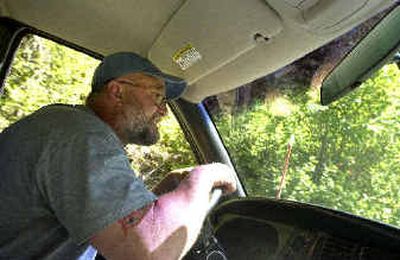Defoliation project dumped

The Idaho Lands Department has canceled a proposed chemical defoliation project for a Rose Lake area clearcut after an outcry by local residents.
The agency wanted to clear the 328-acre logged area before replanting it with seedlings, said Ron Litz, assistant director for forestry and fire. The chemical use was scheduled to begin Monday but was canceled Friday because of the opposition. The clearcut is on the backside of Initial Peak, about five miles south of Cataldo.
“We think we could have done it successfully,” Litz said. “But I understand their concerns on the chemicals. … We just didn’t communicate as well as we needed to as early as we needed to.”
The state now plans to conduct a controlled burn in fall and plant seedlings in spring. Although there’s concern over post-fire erosion on the steep slopes of the clearcut, residents would rather see smoke than the mist of chemicals being sprayed from a helicopter, said Alex D’Andrea, a retired teacher who owns land next to the clearcut. D’Andrea helped generate opposition to the chemical use and gathered data that challenged the state’s belief in the safety of the chemicals.
“You cannot convince us this is foolproof,” he said. “We don’t want five years from now to find out that these chemicals, in fact, leached into our wells.”
D’Andrea is not opposed to using herbicides. “I use Roundup on my fencelines,” he said. But D’Andrea also had two friends die after being exposed to the herbicide Agent Orange during the Vietnam War. “I don’t like the chemicals. If there’s another way to do it, it should be done.”
Many neighbors didn’t even know about the proposal until D’Andrea went door-to-door. He found an ally in state Sen. Dick Compton, R-Post Falls, who urged state officials to kill the project.
The area was logged five years ago. Typically, a controlled burn is conducted shortly after the timber is cut to clear away slash and branches. This makes it easier for seedlings to grow, Litz said. The burn didn’t take place on the Initial Peak project. “We weren’t able to get on it for a couple of years and brush grew up through slash,” Litz said.
The area is now covered with vine maple, ninebark, berry plants and a jungle of brush. Seedlings would have difficulty finding enough sun and water to grow, Litz said. Without burning or chemical treatments, some clearcuts never regrow forest.
The state proposed using two defoliants on the clearcut: Arsenal and Accord. The combination would kill the brush and allow it to dry before the burning season later in the year.
Litz said burning might be less effective without the chemicals, but much depends on the weather.
D’Andrea said it’s a shame the state had to cut so many trees in the first place. He said he has nothing against logging, so long as it’s done right. The entire Initial Peak project might have helped fill a state bank account, but at a cost of obliterating a forest, he said.
“It’s going to be a bazillion years before that clearcut heals up there,” D’Andrea said.